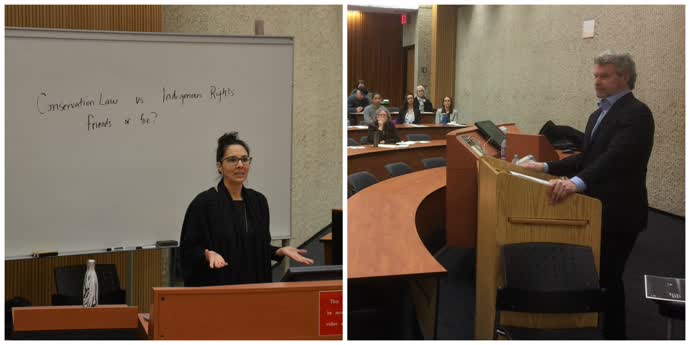
Eriel Deranger (L) and Bill McElhanney (R) presented during the first two days of the 2017 Aboriginal Law Speaker Series, presented by the Indigenous Law Students' Association
Indigenous rights and environmental protection-these issues are often perceived as part and parcel with one another. In innumerable instances they have intersected with near-perfect symmetry, with indigenous activists having become among the world's most vocal proponents of environmental protection and conservation law, while environmental causes have brought numerous non-indigenous activists into common cause with their indigenous counterparts.
But the relationship between environmentalism and indigenous rights has not always been as cohesive as some imagine. Such frictions between these two forces were among the topics addressed by the first two speakers at the Indigenous Law Students' Association's 2017 Aboriginal Law Speaker Series the week of March 6.
Beginning the series on Monday, March 6 was indigenous rights advocate Eriel Deranger, who discussed how the term 'conservationism' has been used to disempower indigenous peoples and still often fails to take indigenous relationships to the land into account. This session was followed on March 7 by environmental lawyer Bill McElhanney, who argued that while indigenous consultation law looks good on paper, in practice, there is much to be done.
Deranger, a member of the Athabasca Chipewyan First Nation (ACFN) in northern Alberta, has worked with a number of indigenous and environmental NGOs, including the Federation of Saskatchewan Indian Nations, the Indigenous Environmental Network, Sierra Club, Rainforest Action Network, and the UN Indigenous Peoples Forum on Climate Change. She approached her topic from a historical standpoint, tracing the evolution of indigenous rights and conservation law from the creation of Rupert's Land in 1670 to modern-day infrastructure projects which, in seeking to mitigate flooding and other natural disasters, has ended up adversely affecting indigenous peoples, as well as other instances of ecological "progress" which has either neglected indigenous peoples or resulted in their disenfranchisement.
"The disenfranchisement of Canada's indigenous peoples began in earnest with the 1850 Act for the Better Protection of Indian Land and Property," she explained.
"What sounds like a nice piece of legislation actually denied indigenous peoples the right to make decisions about their own land. This continued over the next century, with numerous projects done in the name of 'conservation' negatively affecting First Nations and indigenous communities in numerous ways."
McElhanney touched on many of the themes addressed by Deranger, with particular focus placed on recent developments such as the United Nations Declaration on the Rights of Indigenous People (UNDRIP) and the ongoing struggle of Métis people in Alberta and elsewhere to gain recognition as indigenous people.
A partner with Ackroyd LLP in Edmonton and a longstanding advocate of First Nation and Métis rights, McElhanney asserted that even though the Metis Settlements Accord of 1989 acknowledged Métis control of their land - including its subsurface - as a people they are still perceived by many as somehow less than "indigenous" and, as a result, continue to be sidelined in the consultation process.
"Too often government and industry see things hierarchically, dealing with First Nations first and the Métis second, rather than engaging with them as equal partners," he explained.
Like Deranger, McElhanney argued that companies, governments, and other stakeholders have often pursued environmental goals that failed to take into consideration indigenous interests. He cited one case in which an environmental impact study for a proposed oil sands extraction project determined that wildlife would return to the area, but only after a 100-year time period, a violation of Article 29 of UNDRIP, which states that indigenous peoples have the right to the conservation and protection of the environment and the productive capacity of their lands, territories, and resources.
Part of the problem, he argued, is one of terminology - namely the problematic legal term 'stakeholder', which has had the result of placing indigenous peoples' concerns on the same level as those of environmental organizations such as Ducks Unlimited, whose mandate and areas of focus are much narrower. While this problem was highlighted in the landmark Mikisew Cree First Nation v Canada Supreme Court case, which was instrumental in determining the scope of the Crown's duty to consult and accommodate, McElhanney asserted that attitudes have been slow to change.
"The Mikisew case made clear that indigenous peoples are not 'stakeholders' in that they have much more than a 'stake' in what happens to their traditional lands," he said.
"There simply has to be proper consultation with indigenous groups. In the oil sands area, some companies are doing great work, but I still see a lot of consultation that is being done in a less than respectful manner. It perhaps says something about how the deck is stacked that the government departments that oversee this process are called 'Department of Approvals', not 'Department of Denials'. The assumption is generally still that projects are to be approved."